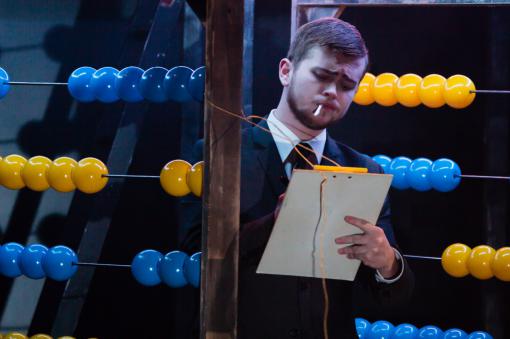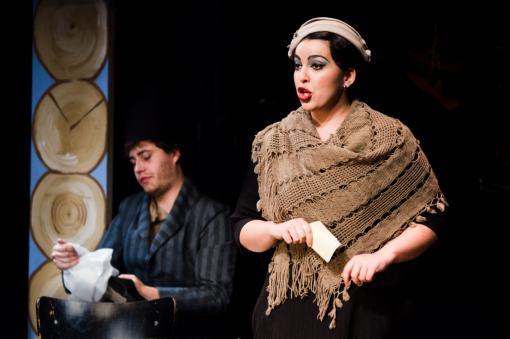Nearly sixty students of the Faculty of Music at the Janáček Academy of Music and Performing Arts joined forces to launch two operas in their home-based Orlí Street Theatre. The evening belonged to a pair of chamber operas. The first one was the premiere of the short opera Mistrová, aneb Když bolševici zrušili Vánoce (Forewomen aka When the Bolsheviks Cancelled Christmas) by Petr Hala. And the opera The Little Prince by Miroslav Hába was performed for the first time after nearly forty years.
The combination of the playful and satirical Mistrová and the work inspired by Saint-Exupéry's existential tale was entrusted to director Kristýna Kopřivová, for whom as well as some of the soloists the premiere was their graduation concert. Mistrová was completed in 2015 and now it premiered. The Little Prince returned on stage for the first time since its premiere in 1979 in Reduta, when it was removed from the repertoire for political reasons due to its idealistic theme soon after the premiere. Both operas are as contrasting as they can be.
 The nature of the scenography, which neared Lada's style, was highlighted by Hala's instrumentation and inconsistent melody. Along with Master Dratvička (Vojtěch Šembera), the scene began with Marie Mičánová in the role of an usherette. The part seemed to be too low for her vocal chords and therefore some sections did not sound sufficiently fully. It seems, however, that the role suited Vojtěch Šembera very well and he was clearly the dominant voice in Mistrová. The singers' parts were not easy in terms of phrasing. Especially Barbora Ďubeková in the role of the Forewoman was somewhat struggling with articulation.
The nature of the scenography, which neared Lada's style, was highlighted by Hala's instrumentation and inconsistent melody. Along with Master Dratvička (Vojtěch Šembera), the scene began with Marie Mičánová in the role of an usherette. The part seemed to be too low for her vocal chords and therefore some sections did not sound sufficiently fully. It seems, however, that the role suited Vojtěch Šembera very well and he was clearly the dominant voice in Mistrová. The singers' parts were not easy in terms of phrasing. Especially Barbora Ďubeková in the role of the Forewoman was somewhat struggling with articulation.
The political satire drawing on the writing by Jaroslav Hašek, which was promoted in the programme leaflet, seemed to have stayed on the paper – the opera had more of a civilian feeling and the sexual references did not help the overall dramatic tone too much. Mistrová as a whole was awkward to say the least. However, the performance of the orchestra was certainly excellent. The oboe stood out pleasantly in terms of timbre and execution. When it comes to rhythm, the score was rich in intricacies which conductor Joel Hána handled well with his leadership.
There was an absolute turnaround on stage after the intermission. The scenography of the guest Jaroslav Záděra switched to a modest and centred design, which purposefully worked with the stage equipment, which reminded the knowledgeable attendees of the original profession of the author of the staging. Decorations also captured attention. The costumes by guest Lenka Černá were magical.
Hába's The Little Prince, sometimes more atonal and abstract than Mistrová alternated between spoken word and vocals. Zuzana Barochová in the lead role was remarkable from the outset. For example, her dialogue with the Pilot played by Tomáš Krejčí, who helped with the musical arrangement as a teacher, was pleasant and believable. Overall, Barochová did not lack the childishly naive expression and gestures. She was excellent the entire time. She sang strongly, clearly and with good articulation. Tomáš Krejčí does not need to sing for the listener to enjoy listening to him. His mild (but distinctive) dramatic recitation was one of the key elements that shaped the atmosphere and the look of the production. Michael Robotka then wonderfully succeeded with the grotesque nature of the restless financier counting the stars. His funny parlando segment was not far from rap. Barbora Ďubeková in the role of the Flower and Marie Mičánová as the Fox appeared on stage for the second time after the intermission. Both fared much better than in the first half of the evening, they were more natural in their conversations with the Little Prince, they were easier to understand and their characters had clearer contours. The performance of Ondřej Musil in his role of the Drunkard was also pleasant. This role basically represented the only visual link between Mistrová (with a suspiciously authentic alcoholic delirium) and The Little Prince, where he as the Drunkard represented the hopeless inability to face his fate. Vojtěch Šembera kept up the bar he set in Mistrová and took on the role of the King with due pathos and resonance. The artists on stage managed to grind off the edges of the sad end of the literary model, letting the audience leave believing that the soul of the deceased Little Prince lives on.
The performance of the orchestra was strong throughout the evening and they were tuned very nicely in long segments. Although the violin did not keep in line in fast sections in terms of intonation, it made up for it with their precise phrasing. The woodwinds excelled again and we cannot forget to mention the smoothly running percussion instruments.
While Mistrová obviously still needs to settle down a little bit and find the correct position, The Little Prince can be recommended as a finished production that has something to say and can do the most important thing – arouse at least a hint of emotion in the audience. There will be four reruns next week in the Orlí Street Theatre.
































